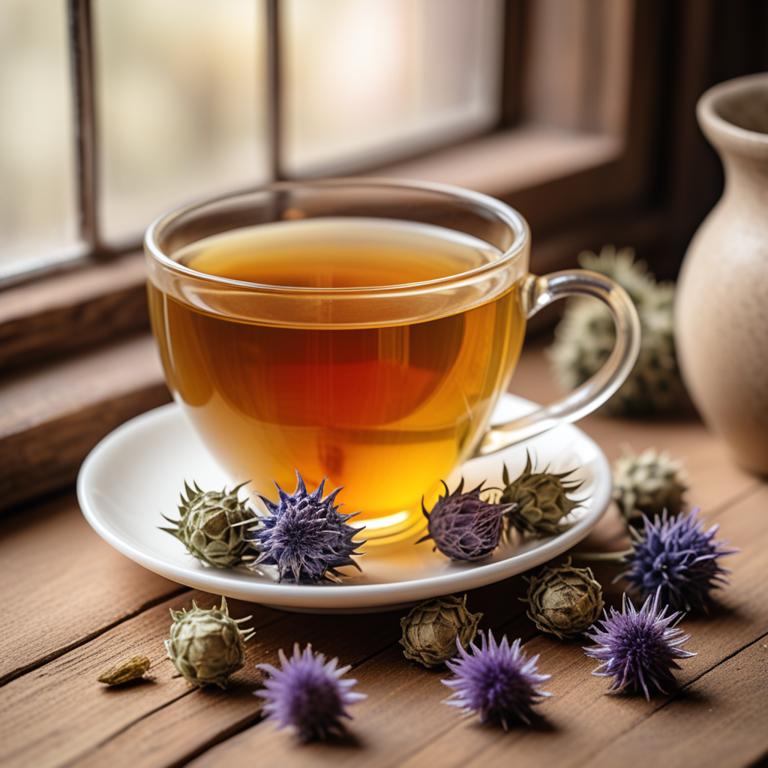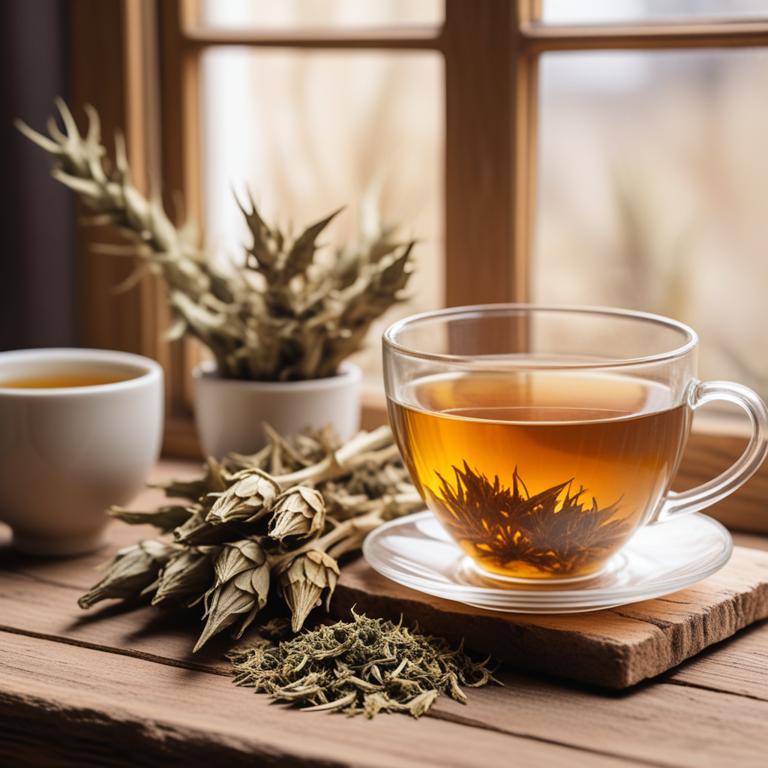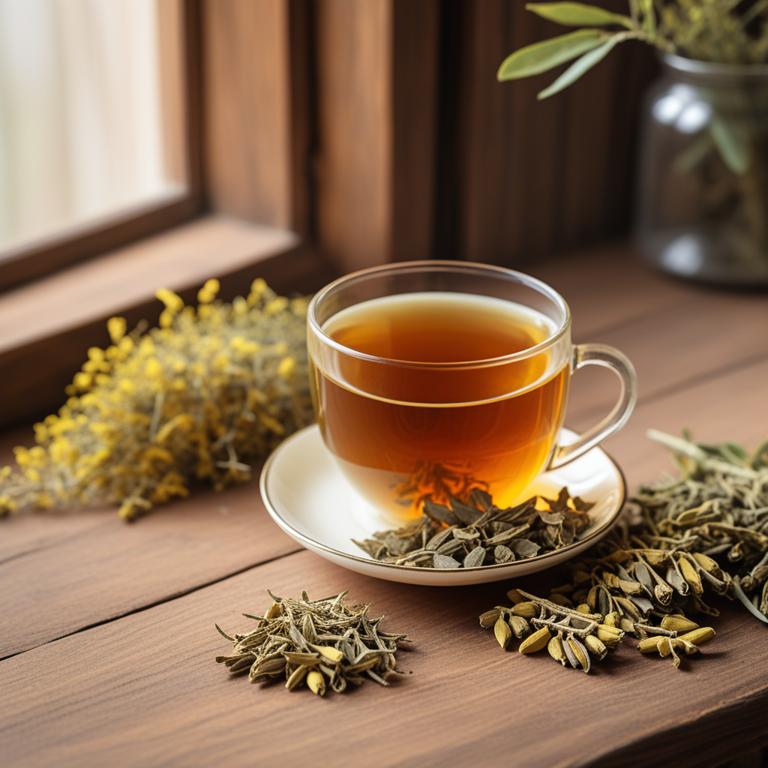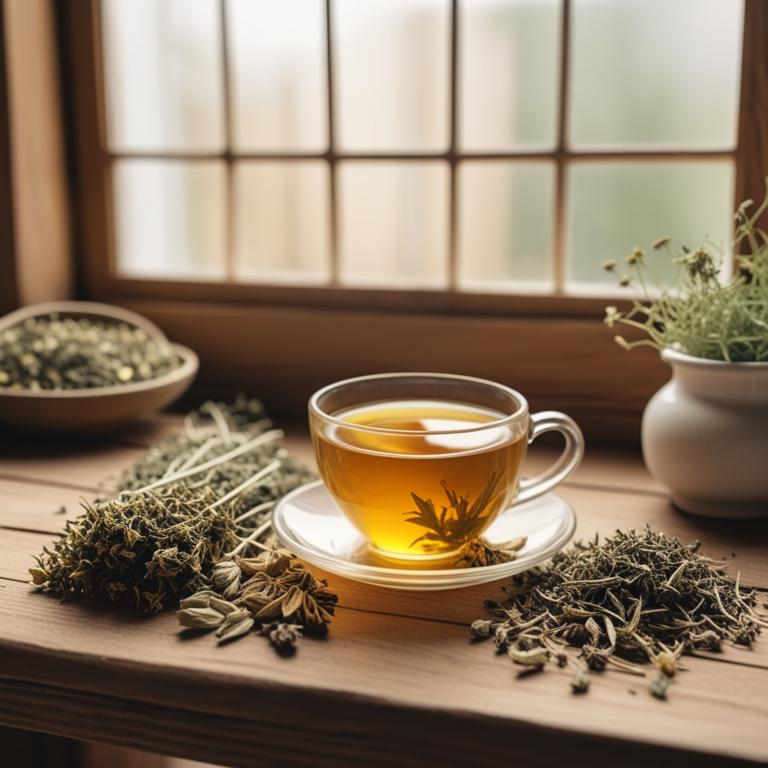9 Best Herbal Teas For Jaundice

Herbal teas for Jaundice are a natural remedy that uses various plant extracts to help alleviate the symptoms and treat the underlying conditions associated with jaundice, a medical condition characterized by the buildup of bilirubin in the blood, causing yellowing of the skin and eyes.
These herbal teas offer several benefits, including reducing liver inflammation, promoting bile production, and improving overall liver function, making them a popular choice for treating jaundice.
Some examples of herbal teas that can help treat jaundice include peppermint tea, which helps to stimulate bile production and improve digestion, dandelion tea, which supports liver function and reduces inflammation, and milk thistle tea, which protects the liver from damage and promotes regeneration.
Additionally, other herbal teas such as turmeric tea, ginger tea, and licorice root tea can also be effective in treating jaundice due to their anti-inflammatory and antioxidant properties.
According to "Plants (Basel, Switzerland)", teas for jaundice can be made using the extracts of plants such as Justicia adhatoda, Emblica officinalis, and Tinospora cordifolia, among others, which have been traditionally used by tribal and rural people in Himachal Pradesh to treat jaundice.
Below there's a list of the 9 best herbal teas for jaundice.
- 1. Silybum marianum teas
- 2. Ginkgo biloba teas
- 3. Taraxacum officinale teas
- 4. Cynara scolymus teas
- 5. Sutherlandia frutescens teas
- 6. Glycyrrhiza glabra teas
- 7. Cassia angustifolia teas
- 8. Ruta graveolens teas
- 9. Eclipta alba teas
Also you may be interested in...
TODAY'S FREE BOUNDLE
Herb Drying Checklist + Herbal Tea Shopping List + Medicinal Herbs Flashcards
Enter you best email address below to receive this bundle (3 product valued $19.95) for FREE + exclusive access to The Aphotecary Letter.
$19.95 -> $0.00
1. Silybum marianum teas

Silybum marianum teas, also known as milk thistle teas, have been used for centuries to treat jaundice due to their hepatoprotective properties.
The silymarin compounds in this herbal preparation help to treat jaundice by reducing liver inflammation, protecting liver cells from damage, and enhancing liver function.
The bioactive constituents, including silibinin, silidianin, and silicristin, have been shown to have antioxidant and anti-inflammatory effects that aid in the recovery of liver health.
The benefits of Silybum marianum teas in treating jaundice include improved liver function, reduced bilirubin levels, and enhanced overall health and well-being.
Related Study
According to "Natural product research", Silybum marianum teas, specifically the fruit extract of white-flowered Silybum marianum variety albiflorum, have been found to have a protective effect against paracetamol-induced liver toxicity in rats, making it a potential treatment option for jaundice.
2. Ginkgo biloba teas

Ginkgo biloba teas have been traditionally used to treat jaundice, an ailment characterized by yellowing of the skin and eyes due to liver dysfunction.
The flavonoids and terpenoids present in Ginkgo biloba teas possess anti-inflammatory and antioxidant properties, which help to alleviate liver damage and improve liver function.
The bioactive constituents, including bilobalide and ginkgolides, exhibit hepatoprotective effects by scavenging free radicals and modulating liver enzymes, thereby facilitating the recovery of liver cells.
The benefits of using Ginkgo biloba teas to treat jaundice include reduced oxidative stress, improved liver function, and enhanced overall well-being, making it a natural and effective remedy for this condition.
3. Taraxacum officinale teas

Taraxacum officinale teas, made from the leaves and roots of the dandelion plant, are a traditional herbal preparation used to treat jaundice.
The tea has hepatoprotective and diuretic properties, which help to treat jaundice by promoting liver function and reducing bilirubin levels.
The bioactive constituents, including flavonoids, terpenoids, and phenolic acids, have antioxidant and anti-inflammatory effects that help to protect the liver and improve bile flow.
Regular consumption of Taraxacum officinale teas can help to alleviate symptoms of jaundice, such as yellowing of the skin and eyes, and promote overall liver health.
4. Cynara scolymus teas

Cynara scolymus teas, also known as artichoke tea, have been used to treat jaundice due to their hepatoprotective properties.
The silymarin, flavonoids, and phenolic acids present in this herbal preparation help to treat jaundice by promoting liver health and reducing liver inflammation.
The antioxidant and anti-inflammatory properties of Cynara scolymus teas aid in the treatment of jaundice by protecting liver cells from damage and reducing oxidative stress.
The benefits of using Cynara scolymus teas to treat jaundice include improved liver function, reduced bilirubin levels, and a decrease in the risk of liver disease.
5. Sutherlandia frutescens teas

Sutherlandia frutescens teas have been traditionally used to treat jaundice, a condition characterized by a yellowing of the skin and eyes due to an accumulation of bilirubin in the blood.
The herbal preparation's hepatoprotective and antioxidant properties help to protect the liver and reduce inflammation, thereby alleviating symptoms of jaundice.
The bioactive constituents, including flavonoids and alkaloids, such as sutherlandioside A, B, and C, have been shown to have anti-inflammatory and antioxidant effects, which aid in reducing liver damage and promoting liver regeneration.
Regular consumption of Sutherlandia frutescens teas has been found to be beneficial in treating jaundice by improving liver function, reducing bilirubin levels, and promoting overall health and well-being.
6. Glycyrrhiza glabra teas

Glycyrrhiza glabra teas have been traditionally used to treat jaundice due to their hepatoprotective properties, which help to protect the liver from damage and promote its functioning.
This herbal preparation contains bioactive constituents such as glycyrrhizin, flavonoids, and triterpenoids that help to improve liver function, reduce inflammation, and enhance bile production, thereby alleviating jaundice symptoms.
Glycyrrhiza glabra teas also exhibit antioxidant and anti-inflammatory properties, which contribute to their potential in treating jaundice by reducing oxidative stress and inflammation in the liver.
The benefits of using Glycyrrhiza glabra teas to treat jaundice include improved liver function, reduced bilirubin levels, and alleviation of symptoms such as yellowing of the skin and eyes.
Related Study
According to the study, Glycyrrhiza glabra teas for jaundice have been scientifically elucidated and have been shown to be hepatoprotective, which means they have a protective effect on the liver.
7. Cassia angustifolia teas

Cassia angustifolia teas have been traditionally used to treat jaundice, an ailment characterized by a yellowish discoloration of the skin and eyes due to elevated bilirubin levels.
The herbal preparation exhibits hepatoprotective properties, which help to protect the liver from damage and promote its functioning.
The bioactive constituents of Cassia angustifolia, including saponins, flavonoids, and glycosides, are responsible for its therapeutic effects, as they help to reduce bilirubin levels and promote liver regeneration.
The benefits of using Cassia angustifolia teas to treat jaundice include improved liver function, reduced bilirubin levels, and enhanced overall health, making it a valuable herbal remedy for this condition.
8. Ruta graveolens teas

Ruta graveolens teas have been traditionally used to treat jaundice, a condition characterized by yellowing of the skin and eyes due to liver dysfunction.
The properties of this herbal preparation, including its hepatoprotective and anti-inflammatory effects, help to treat jaundice by reducing liver damage and inflammation.
The bioactive constituents of Ruta graveolens, such as carvone, limonene, and flavonoids, have been shown to possess antioxidant and choleretic properties, which help to improve liver function and promote the excretion of bile.
Regular consumption of Ruta graveolens teas has been found to provide benefits in treating jaundice, including reduced liver enzyme levels, improved liver function, and enhanced overall health.
9. Eclipta alba teas

Eclipta alba teas have been traditionally used to treat jaundice, a condition characterized by yellowing of the skin and eyes due to liver dysfunction.
The herbal preparation's hepatoprotective properties help to reduce liver inflammation and promote the regeneration of liver cells, thus alleviating the symptoms of jaundice.
The bioactive constituents of Eclipta alba, including flavonoids, triterpenoids, and phenolic acids, exhibit antioxidant and anti-inflammatory activities that contribute to its therapeutic effects.
The benefits of using Eclipta alba teas to treat jaundice include improved liver function, reduced bilirubin levels, and a faster recovery rate, making it a valuable natural remedy for this condition.
Related Study
According to "Indian journal of physiology and pharmacology", Eclipta alba teas for jaundice may be beneficial due to the presence of compounds such as wedelolactone and desmethylwedelolactone in Fraction EaII, which has been shown to exhibit maximum hepatoprotective activity and high safety margin.